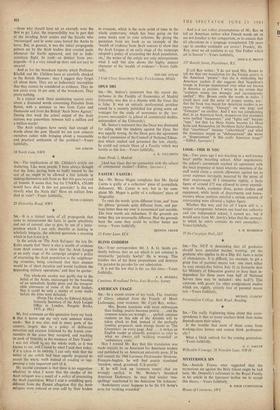AMERICAN USAGE
SIR,—In a recent review of my book, The Anatomy
of Glory, adapted from the French of Henri Lachouque, your reviewer, Mr. Cyril Ray, writes: Mrs. Brown translates with more enthusiasm than feeling; prairie becomes prairie ... and the common nouns are wrongly ... spelled; amateur students on this side of the Atlantic will be taken aback to find, instead of the perfectly familiar grognards, such strange beasts as 'The Grumblers' on every page. And .. . it strikes an English reader as absurdly pompous to refer to what we always call 'walking wounded' as 'ambulatory cases.' May I remind Mr. Ray that this translation was made initially by an American for American readers and published by an American university press. If he will consult the 1960 Larousse Dictionnaire Moderne, Francais-Anglais, he will find prairie translated 'meadow, mead, grassland, U.S.-prairie.'
If he will look up 'common nouns' that are wrongly spelled, in Mr. Webstcr's Standard American Dictionary, he may find similar 'mis- spellings' sanctioned by the American 'Dr. Johnson.'
'Ambulatory cases' happens to be the US Army's term for 'walking wounded.' And is it not rather presumptuous of Mr. Ray to tell an American author what French words are or are not familiar to her compatriots, or to assume that all alterations in a language transplanted 350 years ago to another continent are errors? Frankly, Mr. Ray, must we all continue to say 'Our Father which art in heaven'?—Yours faithfully,
ANNE S. K. BROWN
357 Benefit Street, Providence, R.I.
[Cyril Ray writes : 'I do not need Mrs. Brown to tell me that one translation for the French prairie ia the American "prairie"—but she is misleading her American readers if she suggests that Napoleon's troops in Europe manoeuvred over what are known in America as prairies. I wrote in my review that "common nouns are wrongly and inconsistently spelled"; Mrs. Brown omits the words in italics. I could have said the same of proper names, too : that the book was meant for American readers is no excuse for writing "Genapp" on one page and "Genappc" on another. And I was not complaining that, in an American book, marliouvres (for example) were spelled "maneuvers," and "lights out" became "taps,' but that La Haye Sainte became Le Haye Saint and Alessandria (in Northern Italy) Alessandra: that "exorbitant" became "exhorbitant" and what the translator meant as "disbursement" she wrote as "dispersement." Is this really American usage?' —Editor, Spectator]


































 Previous page
Previous page